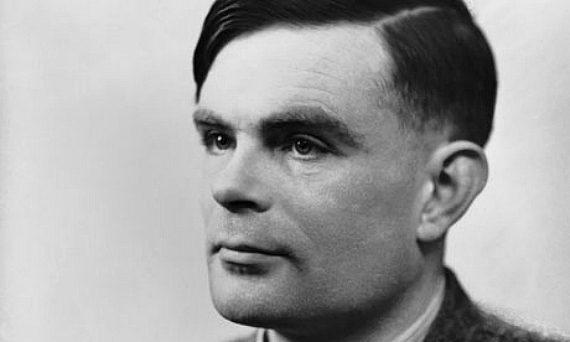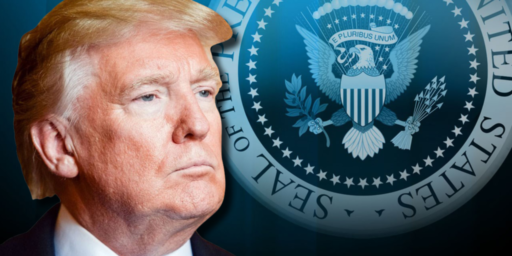Alan Turing, Computer Pioneer Who Broke Engima Code, Pardoned On 1952 Conviction Of Homosexuality
Alan Turing, the computer pioneer who played a crucial role in breaking the Nazi’s Enigma code during World War II only to be convicted in 1952 on charges of “homosexuality,” has been pardoned by Queen Elizabeth II:
Nearly 60 years after his death, Alan Turing, the British mathematician regarded as one of the central figures in the development of the computer, received a formal pardon from Queen Elizabeth II on Monday for his conviction in 1952 on charges of homosexuality, at the time a criminal offense in Britain.
The pardon was announced by the British justice secretary, Chris Grayling, who had made the request to the queen. Mr. Grayling said in a statement that Mr. Turing, whose most remarkable achievement was helping to develop the machines and algorithms that unscrambled the supposedly impenetrable Enigma code used by the Germans in World War II, “deserves to be remembered and recognized for his fantastic contribution to the war effort and his legacy to science.”
The British prime minister, David Cameron, said in a statement: “His action saved countless lives. He also left a remarkable national legacy through his substantial scientific achievements, often being referred to as the ‘father of modern computing.’ ”
Mr. Turing committed suicide in 1954, two years after his conviction on charges of gross indecency. He was 41. In a 1936 research paper, Mr. Turing anticipated a computing machine that could perform different tasks by altering its software, rather than its hardware.
He also proposed the now famous Turing test, used to determine artificial intelligence. In the test, a person asks questions of both a computer and another human — neither of which they can see — to try to determine which is the computer and which is the fellow human. If the computer can fool the person, according to the Turing test, it is deemed intelligent.
In 2009, Prime Minister Gordon Brown issued a formal apology to Mr. Turing, calling his treatment “horrifying” and “utterly unfair.” But Mr. Cameron’s government denied him a pardon last year.
(…)
When Mr. Turing was convicted in 1952, he was sentenced — as an alternative to prison — to chemical castration by a series of injections of female hormones. He also lost his security clearance because of the conviction. He committed suicide by eating an apple believed to have been laced with cyanide.
The queen has the power to issue a “royal prerogative of mercy” to pardon civilians, but rarely does so. Mr. Grayling said that Mr. Turing’s sentence would today be considered “unjust and discriminatory.”
Turing also played what others involved in the project as playing the crucial role in the British project to crack Nazi Germany’s Enigma code, a development that played a crucial role in World War II. You can read a basic summary of Turing’s arrest and trial here. As for why the current UK Government had denied Turing a posthumous pardon, there’s this comment:
Tom McNally, a minister of state for justice, told the House of Lords that the Cameron government stood by the decision of previous governments not to grant a pardon for Mr. Turing’s conviction for gross indecency. Mr. McNally noted that the former prime minister, Gordon Brown, had issued “an unequivocal a posthumous apology” to Mr. Turing in 2009, but he said that Mr. Turing “would have known” that he was committing an offense under the law as it stood at the time.
In the end it took an 87 year old Monarch to do the right thing here. Better late than never, I suppose, but one can only guess at what Turing might have done with his life had he not been unjustly convicted of an “offense” that didn’t belong on the books to begin with.







What kind of future could we have had, if not for the stupidity of man! Just think, if Turing hadn’t be persecuted for what he did, how further advanced we could be. What technological leaps lost, what ideas buried, what inspirations not shared. We live in darker ages when we put out our lights.
This man from the Greatest Generation fought for his country and helped save us all. And they damn well killed him, just because they didn’t like who he was. A stain on humanity’s honor.
Pat Buchanan is outraged, and unfavorably compares Elizabeth II to Vlad the Impaler.
Radiolab (the best podcast there is, imho) did a fascinating program on Mr Turing recently. What the British Government did to that man was despicable, particularly considering his role in defeating Nazi Germany.
(would an appreciable segment of Americans support these treatments even today? Oh, my yes)
But why just pardon Turing? Why not a blanket pardon of all convicted of the same offense?
@JKB:
Because Turing did something IMPORTANT for them and the utter hypocrisy, backstabbing and asshattery involved is just mindblowing. The rest are just criminals as far as they are concerned.
Sickening to add such weasel words to an apology….
Have they pardoned Oscar Wilde yet?
Pardoning an athiest after his death does not actually show respect …
@KM: Well, didn’t Turing know that he was committing a crime?
@john personna:
A religious pardon? Perhaps – depends on if one is willing to accept an official apology even if it comes from an institution they don’t hold faith in.
A political one? Absolutely respectful considering it was an actual legal crime he was accused, tried and convicted of. He got screwed over by the government he saved. They should be doing a hell of a lot more than oops-we-screwed-up. Without Enigma being broken, Germany would have had the advantage for far longer and could have contributed to an Axis victory. This man helped save the free world and they ruined him. Pardon is the very least they can do.
@this:
Seriously, downvoter? The time to make a difference for any oppressed person is in his life. When you try to fix the books later you are just assuaging your own guilt. Now, if you are religious you might think someone is looking down from heaven and getting good feelings … but of course this is an atheist. You have to deny him in that too, to think it makes a difference to him.
It is an attempt by the British government to pardon itself.
@KM:
I suggest that the honorable path is for the government to apologize for its actions with Turing, and as JKB says, so many others.
This pardon is not humble, it holds that the Queen has the right at this late date to redeem Mr. Turing.
I mean geez, think about what a pardon is. You did bad, but we forgive you.
@Pinky:
This whole thing pisses me off beyond belief. Both of my grandfathers and one grandmother served proudly in WWII. I come from a long line of military and we respect those who served. Turning gave the Allies an enormous advantage and did the impossible for the time. Without him, we could have been screwed badly. At least one of my grandparents would have been killed without the warning breaking Enigma gave. He may not have been a solider but damnit that man served and deserves all the respect you’d give any other veteran.
And the man that did it was ruined because he was gay. Because petty closed-minded individuals couldn’t see past a horrid law to the brilliant man behind it. The whole world could have gone to ruin – and a gay man helped save it. Turning is a cautionary tale about treacherous government you’d think would be right up a conservatives’ alley – the war hero cut down by unjust cruel laws.
But he’s gay so… apparently no.
@john personna: The government already issued the apology, but it did not come with the pardon.
And I see the point about it being more useful in life, but ultimately we do posthumous pardons because at heart, your name matters – and your reputation matters.
@Anonne:
Yesterday we all knew Turing, his accomplishments, and how he was wronged by society and government of the time.
@john personna:
You are correct, sir. This is backtracking to appease. But even then they can’t give him the full benefit and must point out he was a criminal then. George Washington and the other Founders were criminals too for rebelling against the Crown. Winners get to be heros, losers get branded criminals. Turning deserved better then; alas, this is all that can be done now for him.
Also, I would quibble your religious note a touch. Pardon may have started out as a religious term but has since entered the legal lexicon with its own nuances and as such, remains the appropriate word and action. I believe its the legal ramifications that make it poignant although I must say there is some schadenfreude in making use of a religious term to force acknowledgement of a wrong done solely because of religious sentiments.
John, it’s a legal mechanism. That’s it, really.
A Thoroughbred “pardoned” by the fleas on his rump.
@KM:
Wikipedia:
Please don’t play games with me that forgiveness by the government is not built into the pardon.
I agree that their apologies are worthwhile, but the pardon attempts to fix something beyond fixing. Way. Too. Late.
@michael reynolds:
British Government: “We pardon Alan Turing 60 years after we fucking castrated him.”
Yay team.
@john personna:
Perhaps I don’t understand your meaning clearly here. I agree that Turning has done nothing that needs forgiving. An apology is meaningless words with no action behind them – one can be sincere or insincere but ultimately words bear little real-world weight. Governments issue apologies for things all the time even if they don’t really mean them – it’s just a messaging thing. A legal pardon excises and wipes clean legal ramifications from a conviction and tends to do more to vindicate an individual then a standard I’m sorry would in the eyes of the public and history at large. As it involved the legal system, pardons tend to have more weight (for me, at least) in apologetic terms due to the effort and gravitas put forth. Ideally, I would like the conviction to be overturned but that’s not going to happen.
Ultimately both are useless to the man himself and are way overdue. Both in this case are acknowledgement the government was wrong. That being said, what makes an official apology more meaningful then an official pardon to you?
@KM:
Indeed. There should be statues to this man all over the U.K. –at the very least.
Turing was castrated by the British government and killed himself in 1954.
Pretty much 60 years later the British government pardons him.
Yay team?
@KM: Actually, I agree with jp here.
An apology admits that you were in the wrong. You may be insincere, but you are publicly saying that you were wrong.
A pardon asserts that you were in the right, but are being magnanimous/merciful. Only the guilty can be pardoned.
I disagree with the “better late than never” sentiment in the article. There is nothing the British government can do or say, with respect to Alan Turing, that improves the situation. A blanket admission that the law was inexcusable, without reference to any individual, would have been infinitely better.
@DrDaveT :
Ah, I see. Like I said, I think all the convictions should be overturned to avoid that sort of technicality. Reverse them all. Not just Turning, everyone who suffered and was punished under the law. But since no government will go through the hassle and effort to do it right, a pardon is the faster route (with all the unfortunate implications attached) to achieve the same ends.
He doesn’t deserve to have criminal listed in his titles. Nothing anyone does for someone posthumously makes a damn bit of difference for them – its always for the living. Instead, this should be an exercise in learning from mistakes, and teaching the next generation not to be as stupid as this one.
@this:
I would suggest, downvoter, that if you can downvote this:
You care more about the idea of Alan Turing, than the man, Alan Turing.
@KM:
What you are really claiming now is expediency for the living:
@john personna: So you’re suggesting the dead lack patience now?
@Tillman:
I am suggesting that compassion for Alan Turing, the man, would revolve around his time arrested, tried, and sentenced to castration (or jail).
I’m sorry to be cynical on Christmas Eve, but this is a little too much “It’s too late for Alan, but we still have time to feel good about ourselves.”
BTW, The Guardian, UK:
Alan Turing’s pardon is wrong
@john personna:
I think the Guardian piece is great with a great “solution”.
Next up, we pardon any runaway slaves who happened to become national heroes.
The Queen’s actions, while better than the rest of the governments, are too little, too late — but a tiny step in the right direction.
How many people convicted of these crimes are still alive? Why not issue a blanket pardon for them, along with an apology, and get to work nullifying those convictions. Maybe a payment for damages.
Otherwise the message it sends is the only good f.gg.t is a dead f.gg.t, provided they helped save the country and have lots of active defenders a half century later. Which is probably not the intended message.
This is one of the reasons why SSM is so important…treating a minority so differently than the majority allows many people to justify their bigotry and prejudice and do things like chemically castrating people who have done nothing wrong…
If we want to honor the memory of someone so deserving of our respect and gratitude, let’s dedicate ourselves to the cause of fighting homophobia and promoting equal justice under the law for all.
@KM:
My problem here is with the non-sequitur. You wouldn’t treat a veteran who robs banks with the same respect that you treat a veteran who doesn’t. It’s not Turing’s public service that makes him merit respect in your eyes. It’s that you don’t agree with the law. Am I saying that Turing was no better than a bank robber? No, that’s not what I’m saying. I’m saying that you wouldn’t apply the standard you’re applying in the case of a non-“horrid” law, so your argument isn’t about Turing’s public service as much as about the law that he was convicted of.
@Pinky:
It is both.
@JKB:
Agreed, all of those convictions should be overturned and the stain on the records of all of the unjustly convicted should be removed. It is too little too late, but would be an act of contrition and healing and could be a balm to the surviving families.